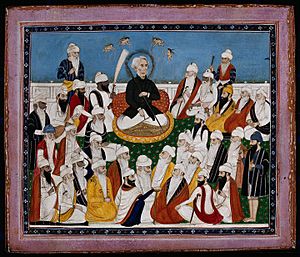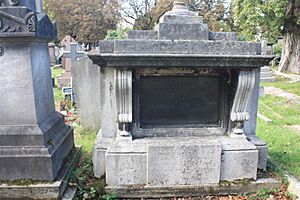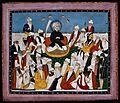Donald Friell McLeod facts for kids
Quick facts for kids
Sir Donald Friell McLeod
|
|
|---|---|

Sir Donald Friell McLeod, surrounded by Sikh elders
|
|
| Lieutenant Governor of Punjab | |
| In office 10 January 1865 – 1 June 1870 |
|
| Governor General | Sir John Lawrence, Bt The Earl of Mayo |
| Preceded by | Sir Robert Montgomery |
| Succeeded by | Sir Henry Marion Durand |
| Personal details | |
| Born | 6 May 1810 Fort William, Calcutta, Bengal Presidency |
| Died | 28 November 1872 (aged 62) London, England, United Kingdom |
| Resting place | Kensal Green Cemetery |
| Alma mater | East India Company College |
Sir Donald Friell McLeod (born May 6, 1810 – died November 28, 1872) was a British official who worked in India. He served as the Lieutenant Governor of the Punjab region from 1865 to 1870. He is remembered for helping to start the Lahore Oriental College, which is now part of the Punjab University. People often remember him as a kind leader who cared about others and strongly supported education. He encouraged both the study of Eastern cultures by Europeans and the learning of European subjects in India.
Contents
Early Life and Education
Donald Friell McLeod was born in Fort William, Calcutta. At that time, Calcutta was part of the Bengal Presidency in British India. His father, Duncan McLeod, was a Scottish military engineer who designed the famous Hazarduari Palace.
In 1814, when he was four years old, Donald was sent to live with his grandfather in Scotland. He went to schools in Edinburgh, Dulwich, and Putney. At Putney, he was classmates with Charles Canning, who later became the first Viceroy of India. In 1826, he joined the East India Company College in England, where he became good friends with John Lawrence. Lawrence would later become an important figure in India, just like McLeod.
Career in India
Starting Out
McLeod returned to India on December 10, 1828, to begin his career with the East India Company. This company was a powerful British trading organization that also governed large parts of India. He first worked in Munger Fort. In 1831, he helped Colonel William Sleeman in a special effort to stop organized crime groups.
Later that year, he became an administrator in the Sagar and Nerbudda region, staying there until 1840. After that, he took charge of the Jubbalpore district. In 1843, McLeod was made a collector and magistrate for Benares. This meant he was in charge of collecting taxes and maintaining law and order. He became very ill in 1845 and took a break in Cape Town, South Africa. He returned to India in April 1847. During his six years in Benares, he made big improvements to the city's management and police, which helped reduce crime a lot.
Leading the Punjab
In 1849, McLeod took over from his friend John Lawrence as the commissioner of the Jullundur division in the Punjab. In 1854, he became the financial commissioner for the entire Punjab province. He got married in October 1854 to the daughter of Robert Montgomery, but sadly, she passed away a few months later after falling ill.
McLeod was in Lahore during the Indian Rebellion of 1857, a major uprising against British rule. After the rebellion ended, he was honored for his service. He went back to England briefly in 1859, his first visit in 30 years. In 1861, he became the head of the Famine Relief Committee, which helped people suffering from food shortages.
In 1865, John Lawrence suggested that McLeod become the Lieutenant Governor of the Punjab. This was a very important position. The next year, he received a high honor, becoming a Knight Commander of the Order of the Star of India. As Lieutenant Governor, McLeod continued the policies of the Lawrence brothers, focusing on developing the Punjab. He oversaw the building of new roads, railways, and canals. He was also very active in the Agri-Horticultural Society of the Punjab. He even paid his own money to bring many different plants and trees to the region from all over the world. His time as governor was peaceful for the Punjab, partly because of better relations with the neighboring Emirate of Afghanistan.
McLeod believed that local people should have more say in managing their own communities. He set up local governments in over 300 areas. He also strongly supported education to help train locals for administrative roles. He encouraged the study of Eastern languages and cultures and believed that education should be taught in local languages, not just English. Because of his efforts, the Indian Government started allowing local languages in universities. They also agreed to create the Oriental College in Lahore in 1866. His work was praised by both Indian people and British officials. To honor him, the McLeod Medal was created. This medal was given to students across the province who got the best results in exams in an Eastern language, along with a cash prize.
Towards the end of his five-year term, he asked for a six-month extension. He wanted to welcome the Duke of Edinburgh during his visit to India and introduce him to the Punjab. His farewell dinner was held in Lahore on May 5, 1870. Many important people, including his friend Lord Napier of Magdala and the Viceroy of India, Lord Mayo, spoke highly of him.
Later Life and Passing
After retiring in 1870, Sir Donald McLeod returned to England and settled in London. There, he became the chairman of the Scinde, Punjab & Delhi Railway company. In London, he was known for his sympathy towards poor people in the East End and was part of a group that helped them.
On November 28, 1872, around 5 PM, Sir Donald was on his way to a meeting. He was at Gloucester Road station on the London Underground when he had a terrible accident. He was trying to get on a train that was already moving and was badly injured. He was taken to St. George's Hospital, where he passed away a few hours later, surrounded by his friends and family.
Sir Donald Friell McLeod is buried in Kensal Green Cemetery in London.
Legacy
Sir Donald McLeod was a deeply religious man and a Baptist. He was also a philanthropist, meaning he gave a lot of his time and money to help others. When he retired, he didn't have much money beyond his pension. Soon after he died, in 1873, his collection of about 2,000 books was bought by the newly formed University College, Lahore (now the University of the Punjab). These books became the start of its university library.
His friend John Lawrence once described him as someone who sometimes took too long to make decisions. However, Lawrence also said that McLeod was morally and intellectually one of the best people in the Punjab. When he died, he was widely respected by both Indian people and Europeans.
The town of McLeod Ganj in India is named after him, as is McLeod Road in Lahore. McLeod's Mews in South Kensington, London, is also thought to be named in his honor.
Images for kids




